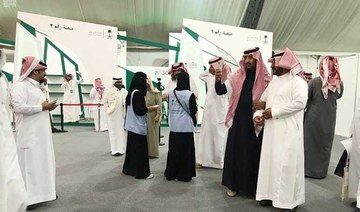RIYADH: The Riyadh International Book Fair, the region’s largest cultural event held in the capital every year, is swirling with activities for the buying and selling of books, with publishers expecting high sales during its final weekend.
The event is hosted at the Riyadh International Convention and Exhibition Center (RICEC) between March 13 and March 23.
Speaking to Arab News on Friday, Sultan Al-Thubaiti, a supervisor with the Ministry of Education who has been stationed at the book fair for the 10-day event, said: “It has been very fulfilling and hugely successful with a variety of books, workshops, plays, Saudi films and cultural events attracting huge numbers of people.”
The fair offers a variety of cultural events to promote the publishing industry in Saudi Arabia. More than 200 events were sponsored by the King Abdul Aziz Center for World Culture-ITHRA (developed by Saudi Aramco).
Megaprojects were in the spotlight for visitors as they entered through four main gates bearing the names of Saudi Vision 2030’s megaprojects: Neom, Qiddiyah, Red Sea and Amaala. The aim was to introduce visitors to the Kingdom’s hopes, ambitions and future plans.
The annual book fair also celebrated Ghazi Al-Gosaibi, a Saudi politician, former minister, diplomat, poet and novelist who died in August 2010. Earlier, an agreement was reached between Arab culture ministers who celebrate one cultural figure every year. This year it was announced through the Riyadh book fair — and the first person chosen by consensus was Al-Gosaibi.
The book fair, which started more than a decade ago, displays a large collection of books on children, Islam, Arab culture, history, medicine, law, science, technology, mass media and communication, as well as biographical accounts, fiction and novels in popular languages including Arabic, English, French, Turkish, Urdu and Spanish.
Dialogue of civilizations
Experts in international relations hailed the relationship between Saudi Arabia and Bahrain as a “model of historical relations that reflect eternal and decisive relations.” Their claims were made during a symposium titled “International Relations: Dialogue of Civilizations,” which was part of the fair.
The symposium was hosted by presenter Iman Bahaidara and featured Dr. Abdullah Al-Madani, a Bahraini academic specializing in international relations, and Dr. Naif Al-Hadari, a Saudi Arabian writer and media adviser specializing in politics.
Al-Madani highlighted the deep bonds between Bahrain and Saudi Arabia in all fields, pointing out that his country has enjoyed security and stability since it was founded.
Protecting historic sites
The economic and cultural importance of preserving archaeological and historical sites in Saudi Arabia and Bahrain was highlighted at a high-profile conference.
Sheikh Ibrahim bin Hamood Al-Khalifa, assistant director of the Arab Regional Center for World Heritage, and King Saud University professors Saeed Al-Saeed and Badr Al-Faqeer, addressed the symposium being staged as part of the fair.
Titled “Archaeological Value of Saudi Arabia and Bahrain,” the event looked at the challenges facing the Arab world, and the need to protect heritage sites which offered economic and cultural benefits to the kingdoms.
The symposium began with a speech by Al-Faqeer who talked about the many human civilizations down the ages that had contributed to the rich archaeological value of Saudi Arabia.
Al-Khalifa explained similar patterns relating to Bahrain and spoke about the cultural, historical and civilizational depth to the two nations.
He also pointed to international efforts aimed at protecting the cultural and natural heritage of the Arab world and spreading knowledge in the conservation of archaeological and natural sites.




























